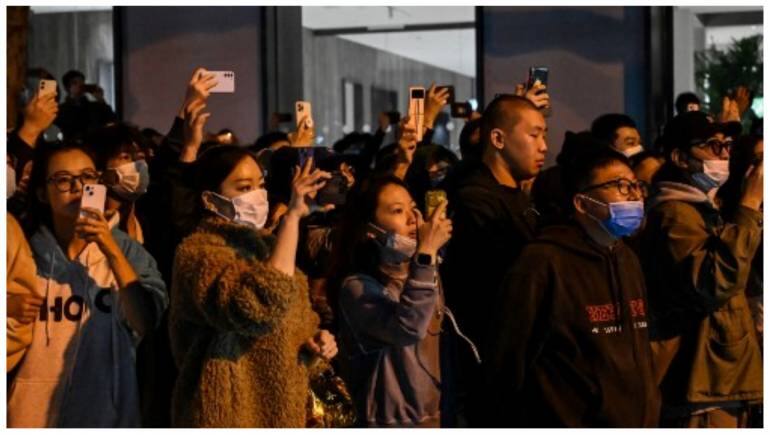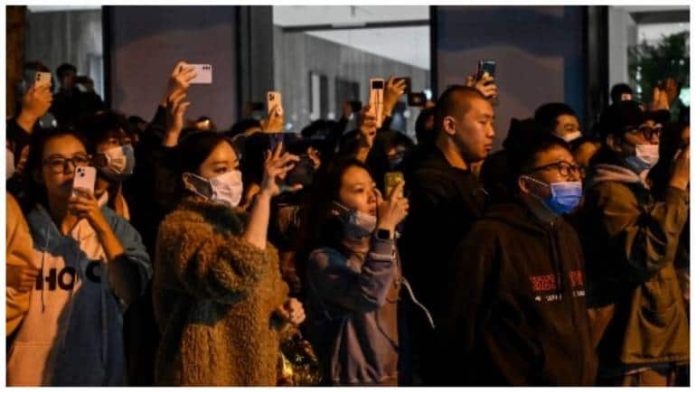


People gather on a street in Shanghai where protests against China’s zero-Covid policy took place.
As anger over China’s strict zero COVID-19 policy intensifies, residents in some major cities took to the streets at the weekend, clashing with police over restrictions that have taken a heavy toll on the economy and people’s freedoms.
In rare scenes of open dissent, some have called for Chinese President Xi Jinping to step down.
= 768 && (adKey.indexOf(“Moneycontrol”) != -1) && (adKey.indexOf(“Moneycontrol_Mobile_WAP”) = 768 && (adKey.indexOf(“MC_ENG_DESKTOP”) != -1 ) && (adKey.indexOf(“MC_ENG_PWA”) < 0) ){ setTimeout(function() {googletag.cmd.push(function() { googletag.display("MC_ENG_PWA/MC_ENG_PWA_NEWS/MC_ENG_PWA_NEWS_AS/MC_ENG_PWA_ROS_NWS_AS_ATF_300") });}, 2000); }if (width
Chinese stocks slumped on Monday as recent monetary easing measures failed to offset investor worries about the protests in the world’s second-largest economy, while the yuan weakened versus the dollar.
Here’s what market watchers are saying about the unrest:
For other comments, please click
ROBERT SUBBARAMAN, CHIEF ECONOMIST ASIA EX-JAPAN, NOMURA, SINGAPORE:
“There is a tail risk that the road to living with COVID is too slow, surging COVID cases fuels more protests and social unrest further weakens the economy are market concerns.
“Things are very fluid. Protests could also be the catalyst that leads to a positive outcome in leading the government to set a clearer game plan on how the country is going to learn to live with COVID, setting a more transparent timetable, and accelerating China’s move to living with COVID.”
= 768 && (adKey.indexOf(“Moneycontrol”) != -1) && (adKey.indexOf(“Moneycontrol_Mobile_WAP”) = 768 && (adKey.indexOf(“MC_ENG_DESKTOP”) != -1 ) && (adKey.indexOf(“MC_ENG_PWA”) < 0) ){ setTimeout(function() {googletag.cmd.push(function() { googletag.display("MC_ENG_PWA/MC_ENG_PWA_NEWS/MC_ENG_PWA_NEWS_AS/MC_ENG_PWA_ROS_NWS_AS_BTF_300") });}, 2000); }if (width
ALVIN TAN, ASIA FX STRATEGIST, RBC CAPITAL MARKETS, SINGAPORE:
“The scale of the protests will necessarily elicit a response from Beijing. The developments have caused pressure on the renminbi and China-related assets such as the Aussie dollar this morning as the market prices in political risk.
“Apart from the risk of further political unrest, near-term COVID risks continue to mount as winter approaches. Much tighter restrictions with associated economic disruptions are more likely in coming weeks than an abrupt loosening.”
HUI SHAN, ECONOMIST, GOLDMAN SACHS, HONG KONG:
“The central government may soon need to choose between more lockdowns and more COVID outbreaks. The current situation imposes further downside risk to our below-consensus Q4 GDP forecast. Our 30% subjective probability of reopening before Q2 next year includes some chance of a forced and disorderly exit.”
KEN CHEUNG, CHIEF ASIA FX STRATEGIST, MIZUHO, HONG KONG:
“The China economy is heading to the direction of reopening but the road to the reopening could be a bumpy one.
“Overall, the China Q4 growth outlook should remain grim given the COVID resurgence and the related mobility tightening. What’s more, the outbreak of the social unrest reflected the prevailing feeling of anti-pandemic fatigue after a long period of lockdowns and all of these will likely suppress consumption.”
JOE CAPURSO, HEAD OF INTERNATIONAL ECONOMICS, COMMONWEALTH BANK OF AUSTRALIA, SYDNEY:
“Even if China is on a path to eventually move away from its zero-COVID approach, the low level of vaccination among the elderly means the exit is likely to be slow and possibly disorderly. The economic impacts are unlikely to be small.”
GARY NG, ECONOMIST, NATIXIS, HONG KONG:
“The market does not like uncertainties that are difficult to price and the China protests clearly fall into this category. It means investors will become more risk-averse.
“The China-linked markets across Asia, such as Australia, Hong Kong, Taiwan and Korea, are more likely to see a larger impact.”
MARTIN PETCH, VICE PRESIDENT, MOODY’S INVESTORS SERVICE:
“We expect the protests … to dissipate relatively quickly and without resulting in serious political violence.
“However, they have the potential to be credit negative if they are sustained and produce a more forceful response by the authorities.”

